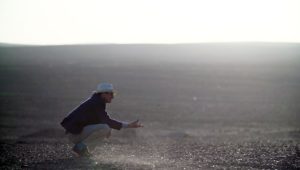The independent documentary film There Will Be Water premieres Saturday June 11 at the Sheffield Doc/Fest, the most prestigious British documentary film festival and the third largest documentary film festival in the world.
There Will Be Water is the story of the British engineer Bill Watts, Technology Manager of The Sahara Forest Project, taking part in the pursuit of the ambitious vision of greening desert areas whilst producing food, freshwater and clean energy at the same time.
The new 59 minute documentary film, directed by Danish film maker Per Liebeck and produced by Copenhagen Film Company, is nominated for the Sheffield Doc/Fest “Environmental Jury Award”.
Bill Watts from SFP in “There Will Be Water”. Photo Credit: Copenhagen Film Company
-On behalf of the Sahara Forest Project I congratulate the producers on their achievement, CEO Joakim Hauge said.
The film tells the background story of how a Sahara Forest Project pilot model was established in the desert of Qatar. The film makers follow Mr. Watts during an intense and stressful construction period. The goal of this unique pilot project was to demonstrate that it was possible to provide suitable growing conditions that enable year-round profitable cultivation of high-value vegetable crops under rough climate conditions in the Qatari desert.
In a case study by FAO, the Food and Agriculture Organization of the United Nationals, it was later documented that the successful Sahara Forest Project pilot model in Qatar produced crops just as good as any normal European greenhouse operation by only using 50% of the water normally used at similar operations.
-An example of extensive global media interest
-More and more people are realizing the potential for answering some of our times most pressing issues through creating a restorative growth. This independent Danish documentary is an example of the extensive global media interest in The Sahara Forest Project, CEO Joakim Hauge said.
He said he believed the film is important as we are facing critical challenges in providing enough sustainably produced food, freshwater and energy for a world population expected to reach 9 billion people in 2050.
-Today the trend of desertification is happening 30 times faster than ever before in the history of mankind. This trend must be stopped. The environmental challenges of our time are closely interlinked. The Sahara Forest Project is pushing for a future with interlinked solutions, Hauge said.
-Will be screened on national broadcastsers in Scandinavia
At the Sheffield Doc/Fest around 30.000 attendees will have the opportunity to visit one of the three screenings during the five day film festival.
According to the Copenhagen Film Company, the film will be screened on Danish and Norwegian national television later in 2016.
A trailer for the new film can be found here.
For more information, please contact:
Magnus Borgen, Head of Communications SFP, magnus@saharaforestproject.com, +47 977 28 476
The film producers can be contacted at:
Per Liebeck, Director “There Will Be Water”, pl@cphfilmcompany.dk phone: ++47 940 58 842
Ulrik Gutkin, Producer “There Will Be Water”, ug@cphfilmcompany.dk, phone: +45 4071 7277
About SFP:
The Sahara Forest Project is a Norwegian-registered private limited company with offices in Norway, the UK and Jordan that offers attractive restorative growth opportunities for arid areas.
The uniqueness of the SFP concept lies in bringing out the potential that exist in the synergies between technologies across industry sectors. With nature as an inspiration, the Sahara Forest Project has designed a technological system where the waste product from one technology is used as resource for another. This integrated technological system creates beneficial synergies and increased technological efficiency. The project has set out to enable restorative growth using restorative practices to establish vegetation in arid areas and reverse the trend of desertification. The process will be catalyzed by combining environmental technologies such as the evaporation of saltwater to create cooling and distilled fresh water (i.e. in a saltwater cooled greenhouse) and solar thermal energy technologies.
The combination is designed to utilize what we have enough of to produce what we need more of, using deserts, saltwater and CO2 to profitably produce sustainable food, freshwater, clean energy and create green jobs.

